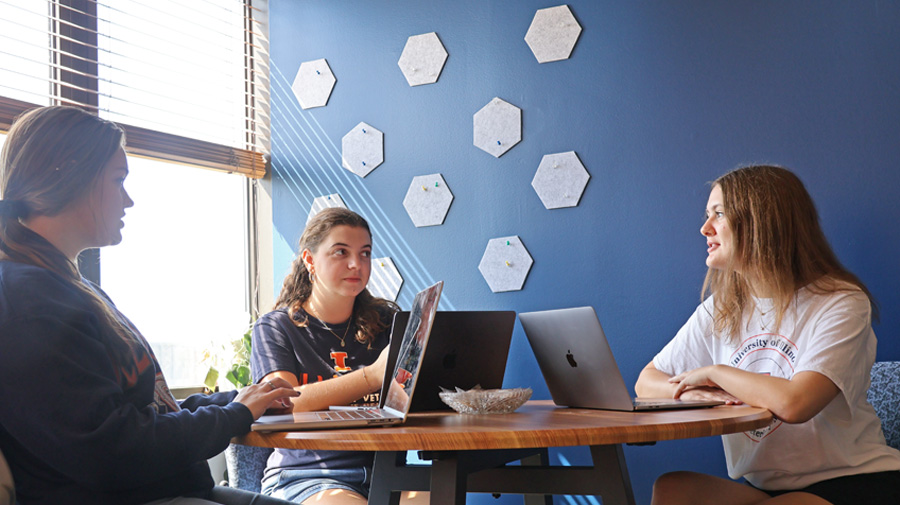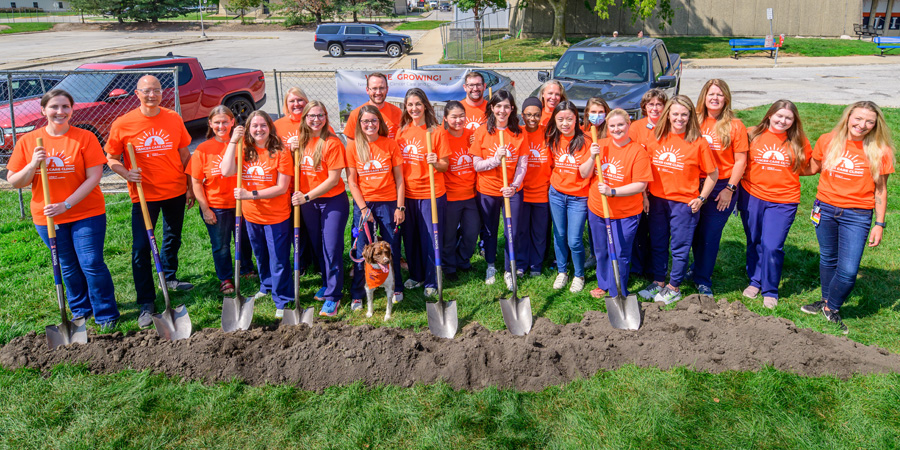This message will appear in the April/May 2019 issue of the Chicago Veterinary Medical Association Bulletin. Above, oncologists Drs. Kim Selting, Laura Garrett, and Tim Fan joined Dean Peter Constable and Provost Andreas Cangellaris to break ground for the linear accelerator wing on May 7, 2018.
Linear Accelerator Operational in June
On June 10 we’ll celebrate the installation of a Varian TrueBeam® linear accelerator. (See images from the event.) In human radiation oncology, the TrueBeam® represents the top of the line, and it is expected to remain the standard of care for decades. We’re the second veterinary college to offer this level of cancer care technology. The daylong gala in June will showcase how the TrueBeam® will elevate patient care and cancer research.
“The linear accelerator exponentially grows the capacity of the oncology service to deliver cancer care,” notes Dr. Tim Fan, who has been part of the service since starting his residency here 20 years ago. “People throughout the Midwest will bring their pets to Illinois for treatment.”
At its heart, though, the most powerful aspect of the Illinois oncology program is not the technology: it’s the people.
Veterinary Cancer Leadership
Dr. Laura Garrett, a veterinary oncologist (and Illinois DVM graduate) who joined the faculty in 2006, puts it this way: “We have a small footprint, but a big impact.”
That impact is national and international. Dr. Fan is current president of the Veterinary Cancer Society, an organization of nearly 1,000 specialists, general practitioners, students, and technicians from around the world. Preceding him in the role was Dr. Kim Selting, who is double-boarded in medical oncology and radiation oncology and who joined our faculty in 2017 to guide the acquisition of the TrueBeam®.
Dr. Garrett has also served as VCS president, completing her two-year term in 2015. She is currently president-elect for all specialties of the American College of Veterinary Internal Medicine.
All three have worked on the ACVIM committee that oversees the oncology specialty board examination. Drs. Garrett and Fan have served on the committee that creates the programming for the oncology specialty forum, and Drs. Garrett and Selting have helped plan World Veterinary Cancer Congress events, which occur every four years and unite VCS with veterinary oncology groups based in Japan, Brazil, and Europe.
Legacy through Residency Training
The Illinois oncology lineage continues to grow through our outstanding medical oncology training program. To date, 16 specialists have completed a residency in the past 15 years. Currently the service has four residents and a clinical trial intern.
Dr. Alycen Lundberg, our newest faculty member, is one of the most recent beneficiaries of this training. Like Dr. Fan before her, Dr. Lundberg came to Illinois for a residency and is continuing as a faculty member as she simultaneously pursues a PhD.
“This is the best residency!” she exclaims. “It’s not uncommon for residents in other specialties or programs to be eager to leave after three years. I wanted to stay and continue to be part of it.”
The residency is in high demand. “We typically have 30 or more applicants for a single residency spot,” says Dr. Garrett. “And we require a master’s degree, which not all residency programs do—and not all residents want.”
“Our residents complete master’s projects that represent good, solid science,” adds Dr. Lundberg. In support of this assertion, Illinois oncology residents won two of the four awards for their presentations at the most recent VCS meeting.
Ongoing Discovery
The Illinois cancer research program provides a strong underpinning for the service and training efforts. Dr. Fan has long collaborated with Illinois faculty in physical sciences on anticancer drug discovery. These collaborations and our participation in the National Cancer Institute’s Comparative Oncology Trial Consortium make novel treatments such as PAC-1 available to pets with cancer while advancing human cancer care. Drs. Selting and Lundberg also conduct research with translational potential to help both pets and people.
As our campus pursues designation as a Basic Science Cancer Center from the National Cancer Institute, our college’s oncology program plays a vital role, delivering expertise in both cancer biology and clinical trials involving pets with naturally occurring cancers.
The linear accelerator will augment this research. “I’m very interested in maximizing immune therapies,” says Dr. Fan. “Radiation is a means to stimulate the immune system. I want to explore how we can harness the immune system to fight cancer.”

![[Peter Constable, Kim Selting, Andreas Cangellaris, Laura Garrett, Tim Fan]](https://vetmed.illinois.edu/wp-content/uploads/2021/04/dean-lin-acc.jpg)


